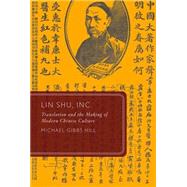Lin Shu, Inc. Translation and the Making of Modern Chinese Culture
, by Hill, Michael Gibbs- ISBN: 9780190278281 | 0190278285
- Cover: Paperback
- Copyright: 1/1/2016
How could a writer who knew no foreign languages call himself a translator? How, too, did he become a major commercial success, churning out nearly two hundred translations over twenty years?
Lin Shu, Inc. crosses the fields of literary studies, intellectual history, and print culture, offering new ways to understand the stakes of translation in China and beyond. With rich detail and lively prose, Michael Gibbs Hill shows how Lin Shu (1852-1924) rose from obscurity to become China's leading translator of Western fiction at the beginning of the twentieth century. Well before Ezra Pound's and Bertolt Brecht's "inventions" of China revolutionized poetry and theater, Lin Shu and his assistants--who did, in fact, know languages like English and French--had already given many Chinese readers their first taste of fiction from the United States, France, and England. After passing through Lin Shu's "factory of writing," classic novels like Uncle Tom's Cabin and Oliver Twist spoke with new meaning for audiences concerned with the tumultuous social and political change facing China.
Leveraging his success as a translator of foreign books, Lin Shu quickly became an authority on traditional Chinese culture who upheld the classical language as a cornerstone of Chinese national identity. Eventually, younger intellectuals--who had grown up reading his translations--turned on Lin Shu and tarred him as a symbol of backward conservatism. Ultimately, Lin's defeat and downfall became just as significant as his rise to fame in defining the work of the intellectual in modern China.
Lin Shu, Inc. crosses the fields of literary studies, intellectual history, and print culture, offering new ways to understand the stakes of translation in China and beyond. With rich detail and lively prose, Michael Gibbs Hill shows how Lin Shu (1852-1924) rose from obscurity to become China's leading translator of Western fiction at the beginning of the twentieth century. Well before Ezra Pound's and Bertolt Brecht's "inventions" of China revolutionized poetry and theater, Lin Shu and his assistants--who did, in fact, know languages like English and French--had already given many Chinese readers their first taste of fiction from the United States, France, and England. After passing through Lin Shu's "factory of writing," classic novels like Uncle Tom's Cabin and Oliver Twist spoke with new meaning for audiences concerned with the tumultuous social and political change facing China.
Leveraging his success as a translator of foreign books, Lin Shu quickly became an authority on traditional Chinese culture who upheld the classical language as a cornerstone of Chinese national identity. Eventually, younger intellectuals--who had grown up reading his translations--turned on Lin Shu and tarred him as a symbol of backward conservatism. Ultimately, Lin's defeat and downfall became just as significant as his rise to fame in defining the work of the intellectual in modern China.







